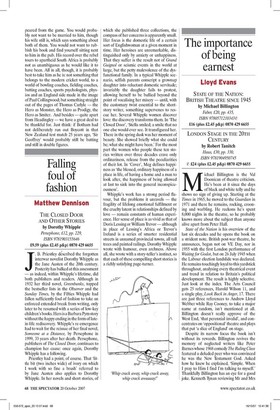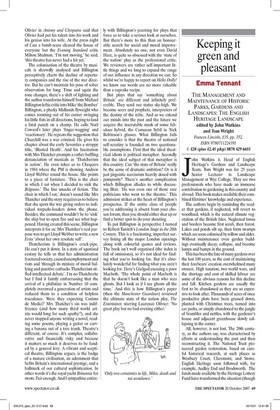The importance of being earnest
Lloyd Evans STATE OF THE NATION: BRITISH THEATRE SINCE 1945 by Michael Billington Faber, £20, pp. 435, ISBN 9780571210343© £16 (plus £2.45 p&p) 0870 429 6655 LONDON STAGE IN THE 20TH CENTURY by Robert Tanitch Haus, £30, pp. 330, ISBN 9781904950745 © £24 (plus £2.45 p&p) 0870 429 6655 Michael Billington is the Val Doonican of theatre criticism. He's been at it since the days of black and white telly and he shows no sign of giving up. Starting at the Times in 1965, he moved to the Guardian in 1971 and there he remains, rocking, crooning and warbling. He reckons he's spent 8,000 nights in the theatre, so he probably knows more about the subject than anyone alive apart from Peter Hall.
State of the Nation is his overview of the last six decades and he opens the book on a strident note. British post-war theatre, he announces, began not on VE Day, nor in 1955 with the first London performance of Waiting for Godot, but on 26 July 1945 when the Labour election landslide was declared. He remains touchingly loyal to this yardstick throughout, analysing every theatrical event and trend in relation to Britain's political development. The result is highly selective. Just look at the index. The Arts Council gets 25 references, Harold Wilson 11, and a single play, Look Back in Anger, 17. There are just three references to Andrew Lloyd Webber while Ray Cooney, to take a major name at random, isn't mentioned at all. Billington doesn't really approve of the West End, 'that perennial invalid', and concentrates on 'oppositional' theatre and plays that put 'a slice of England' on stage.
Despite its narrow focus the book isn't without its rewards. Billington revives the memory of neglected writers like Peter Barnes whose 1968 comedy The Ruling Class featured a deluded peer who was convinced he was the New Testament God. Asked how he knew he explained, 'Simple. When I pray to Him I find I'm talking to myself.' Thankfully Billington has an eye for a good joke. Kenneth Tynan reviewing Mr and Mrs Olivier in Antony and Cleopatra said that Olivier had put his talent into his work and his genius into his wife. At the press night of Cats a bomb-scare cleared the house of everyone but the Evening Standard critic Milton Shulman. 'I'm not moving,' he said, 'this theatre has never had a hit yet.'
The colonisation of the theatre by musicals is shrewdly analysed and Billington perceptively charts the decline of repertory companies and the rise of the star director. But he can't maintain his pose of sober observation for long. Time and again the tone changes, there's a shift of lighting and the author transforms himself from Michael Billington leftie critic into Mike 'the Bomber' Billington, a plucky Midlands flyweight who comes zooming out of his corner swinging his little fists in all directions, hoping to land a fatal punch on a champ. He calls Noel Coward's later plays 'finger-wagging' and 'reactionary'. He repeats the suggestion that Churchill was a war criminal. He gives his chapter about the early Seventies a stroppy title, 'Blasted Heath'. And his fascination with Mrs Thatcher prompts a rather baffling denunciation of musicals as `Thatcherism in action'. He even takes us to Chequers in 1984 where the PM is showing Andrew Lloyd Webber round the house. She points to a piece of furniture. 'This is the chair in which I sat when I decided to sink the Belgrano.' The line smacks of fiction. 'The chair in which I sat,' doesn't sound like Mrs Thatcher and the story requires us to believe that she spent the war giving orders to individual torpedo-loaders down the phone. Besides, the command wouldn't be to 'sink' the ship but to open fire and see what happened. Having created this scene, Billington interprets it for us: Mrs Thatcher's real purpose was to get Lloyd Webber to write a new Evita 'about her own resolute self'.
Thatcherism is Billington's crack-pipe. He can't put it down. In a state of agonised ecstasy he tells us that her administration fractured society, caused unemployment and riots and 'through its mixture of moral bullying and punitive cutbacks Thatcherism stifled intellectual debate'. I'm no Thatcherite but I find it faintly embarrassing that the arrival of a philistine in Number 10 completely overawed a generation of artists and reduced them to a condition of helpless truculence. Were they expecting Cosimo de Medici? Mrs Thatcher's sin was indifference (and how many third world artists would long for such apathy?), and she never stopped anyone writing a novel, reading some poems, playing a guitar or carving a banana out of a tree trunk. Theatre's different, of course. It's complex, collaborative and financially risky and because it matters so much it deserves to be funded by a general levy. A vibrant and sceptical theatre, Billington argues, is the badge of a mature civilisation, an adornment that befits Britain's international prestige, and a hallmark of our cultural sophistication. In other words it's the royal yacht Britannia for swots. Fair enough. And I sympathise entirely with Billington's yearning for plays that force us to take a serious look at ourselves But there's more to this than an honourable search for social and moral improvement. Absolutely no one, not even David Hare, is quite so obsessed with the 'state of the nation' play as the professional critic. We reviewers are rather self-important little things and we long to expand the range of our influence in any direction we can. So whilst we're happy to report on Hello Dolly! we know our words are no more valuable than a cupcake recipe.
But plays that say 'something about Britain' are different and infinitely preferable. They send our status sky-high. We become seers and prophets, interpreters of the destiny of the tribe. And as we extend our minds into the past and the future we acquire the inscrutable mask of some fabulous hybrid, the Cumaean Sybil in Nick Robinson's glasses. What Billington fails to consider is that the theatre of national self-scrutiny is founded on two questionable assumptions. First that the ideal theatrical idiom is political metaphor. Secondly that the ideal subject of that metaphor is this country. Can 'the state of Britain' really be the acme of dramatic ambition? Or is it just jingoistic narcissism heavily dosed with pomposity? There's another complication which Billington alludes to while discussing Blair. 'He was even one of those rare politicians who went to the theatre.' This admission strikes at the heart of Billington's prospectus. If the entire class of people you're addressing is absent from your chosen forum, then you should either shut up or find a better spot to do your shouting.
To put Billington in perspective I turned to Robert Tanitch's London Stage in the 20th Century. This is a fascinating, imperfect survey listing all the major London openings along with colourful quotes and reviews. The book isn't well organised (the index is full of omissions), so it's not ideal for finding what you're looking for. But it's absolutely wonderful for finding what you aren't looking for. Here's Gielgud excusing a poor Macbeth. 'The whole point of Macbeth is that he doesn't look like a man who sees ghosts. But I look as if I see ghosts all the time.' And this is how Billington's paper (then the Manchester Guardian) reviewed the ultimate state of the nation play, The Entertainer, starring Laurence Olivier: `No great play but no bad evening either.'








































































 Previous page
Previous page